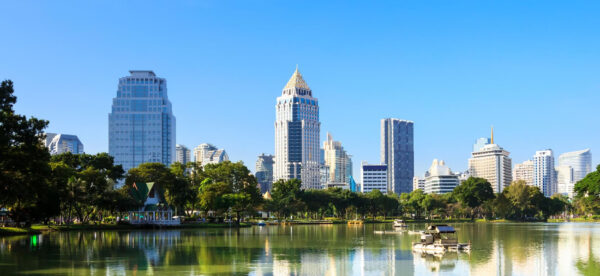Are you considering buying, owning, or selling property in Bangkok? Whether you’re an international investor or someone planning to make Bangkok your second home, understanding the legalities and processes can help you make informed decisions. Here, we answer some of the most common questions about purchasing and managing property in Thailand’s vibrant capital city.
1. Can Foreigners Buy Property in Bangkok?
Yes, foreigners can buy property in Bangkok, but with some restrictions. While Thai law does not allow foreigners to own land, they are permitted to own condominiums, provided that no more than 49% of the total units in a building are foreign-owned. As long as the building’s foreign ownership quota has not been exceeded, foreigners can purchase a condo with full freehold ownership.
For those interested in owning houses or villas, foreigners can lease land for up to 30 years with an option to renew.
2. What Types of Property Can Foreigners Own?
Foreigners can legally own:
- Condominiums (with freehold ownership)
- Buildings on leased land (like houses or villas, but the land itself must be leased)
Foreigners are prohibited from owning land outright in Thailand, but they can lease it or form a joint venture with a Thai national to acquire a property on Thai land.
3. What is the Process for Buying Property in Bangkok?
Here’s a simplified step-by-step guide to buying a property in Bangkok:
- Research and property search: Work with a real estate agent to identify suitable properties.
- Reservation deposit: Once you select a property, you’ll need to pay a reservation deposit, typically 1-3% of the property value.
- Sales and Purchase Agreement (SPA): After paying the deposit, the buyer and seller sign an agreement, which outlines the terms of sale.
- Transfer of ownership: The final payment and ownership transfer happen at the Land Department. This process includes paying any relevant taxes and fees.
Prime Meridian LX can assist you throughout this entire process, ensuring that every step is smooth and compliant with Thai property laws.
4. What Fees and Taxes Are Involved in Buying a Property?
When purchasing a property in Bangkok, the main fees and taxes involved include:
- Transfer fee: 2% of the property’s appraised value, usually split between buyer and seller.
- Stamp duty: 0.5% of the appraised value, applicable if exempt from business tax.
- Withholding tax: 1% of the appraised value (if the seller is a company) or progressive rates based on income (if the seller is an individual).
- Specific business tax: 3.3% of the selling price or appraised value, applicable if the property has been owned for less than five years.
5. How Do I Pay for the Property?
Payments for properties in Thailand are typically made via bank transfers. If you are a foreign buyer, the funds must be transferred from abroad in foreign currency, and the Thai bank will convert the money into Thai baht. You’ll need to present a Foreign Exchange Transaction Form (FETF) from the bank at the time of registration, proving that the funds used to purchase the condo were sent from outside Thailand.
6. Can I Get a Mortgage in Thailand?
Foreigners may find it challenging to secure a mortgage from a Thai bank unless they have long-term residency or work permits. However, some banks offer loans to foreigners under specific conditions, and foreign banks or lenders in your home country may provide financing options for purchasing property in Thailand.
7. Can I Rent Out My Condo?
Yes, as a condo owner, you can rent out your unit to both short-term and long-term tenants. Condos in Bangkok are popular with expats and tourists, making them a sound investment if you plan to generate rental income. However, it’s important to check with the building management, as some properties may have rules against short-term rentals.
8. What Are the Common Ownership Fees for Condominiums?
Condo owners are typically required to pay:
- Common area maintenance fees: This covers the upkeep of shared spaces like pools, gyms, and gardens. It’s usually charged per square meter of the unit annually.
- Sinking fund: A one-time payment made when you buy the condo, used for major repairs or upgrades to the building.
These fees vary by building, but they are generally affordable compared to other international cities.
9. What Are the Rules on Selling a Property in Bangkok?
Selling a property in Bangkok involves similar steps to the buying process:
- Listing the property: Work with a real estate agent to market the property.
- Finding a buyer: Negotiate the sales terms, and sign a sales agreement with the buyer.
- Taxes and fees: The seller is responsible for specific business tax, withholding tax, and any other applicable fees.
- Ownership transfer: This occurs at the Land Department, where the buyer pays any outstanding amount, and the property is officially transferred.
10. What Taxes Are Involved When Selling Property?
When selling property, the main taxes include:
- Withholding tax: Based on the appraised value, this tax varies depending on whether the seller is an individual or a company.
- Specific business tax: Applicable if the property is sold within five years of ownership, at a rate of 3.3% of the sale price or appraised value.
- Stamp duty: 0.5% of the appraised value, paid if the property is exempt from business tax.
11. Can I Sell My Condo to Another Foreigner?
Yes, you can sell your condo to another foreigner, as long as the foreign ownership quota in the building (49%) is not exceeded. If the quota has been filled, the buyer will need to be a Thai national or a company owned by a Thai.
12. Do I Need a Lawyer to Buy Property in Bangkok?
While it’s not mandatory to hire a lawyer, it’s highly recommended. A local real estate lawyer will ensure that all contracts are in order, perform due diligence, and ensure the buying process complies with Thai laws. At Prime Meridian LX, we work with trusted legal partners to offer you comprehensive legal support throughout the transaction.
13. Is Property a Good Investment in Bangkok?
Absolutely! Bangkok’s real estate market continues to grow, and property in central areas remains in high demand. With a stable rental market, thriving tourism industry, and ongoing infrastructure improvements, Bangkok condos offer strong potential for rental income and long-term appreciation.
Final Thoughts
Investing in property in Bangkok can be a rewarding experience, but it’s important to have the right guidance. At Prime Meridian LX, we specialize in helping foreign buyers navigate the complexities of the Thai real estate market, ensuring a smooth and secure transaction. Whether you’re buying, renting, or selling, we’re here to support your real estate journey.
For more information or to browse our exclusive listings, contact us today.



